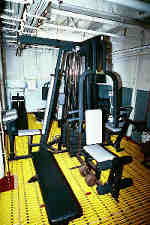| |
Teacher
Logbook:
Sunday, July 2, 2000 1800
hrs.
The good weather is holding.
Cross your fingers. ROPOS spent the day positioning the remaining 5 extensometers.
Piloting the machine is an arduous task and simple jobs take long periods
of time. It takes over two hours to remove a single extensometer from
the mooring elevator, locate the benchmark, and place the extensometer
in it. The ROPOS pilot and advisors are patient and precise in their placements
and measurements. Accuracy in science is essential. No details are overlooked,
even for this seemingly simple task. With input from the daily science
meeting, chief scientist, Bob Embley, continues adjusting the plan for
our dives once we get to Axial. Everyone out here must remain flexible.
For an isolated platform,
our ship has a surprising amount of things to do. When I'm not busy staying
informed about ROPOS or squeezing information out of one of the scientists,
I have a number of options: Lift weights in the mini weight room to work
off the endless supply of food; Practice my table tennis for the upcoming
tournament; Attend one of the two evening movies, or just veg out in front
of one of the ROPOS cams scattered throughout the ship.
The R/V RONALD H. BROWN,
I've been told, is one of the best-equipped scientific research vessels
in the world. Using Global Positioning Systems and the ship's dynamic
positioning system the driver can keep the ship within several meters
of a particular spot. This is a considerable improvement over ships without
these systems because they may drift considerable distances. That would
make it impossible to use ROPOS for some of the vent studies because the
sub is tethered to the ship. The research conducted during NeMO 2000 would
simply not be possible without the technology available today.
Jeff
|
|

Things to do at sea: Ron Brown's
exercise room below decks in the engine/storage compartments.
|
|

